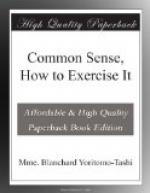“Common sense compels reason to admit principles whose justice it has already recognized, and, at the same time, incites reason to reject those whose absurdity it has demonstrated.
“Common sense allies itself with reason, in order to make that selection of ideas which personal interest can either set aside entirely or modify by illogical inference.
“Reason obeys certain laws, all of which can be united in one sentiment—common sense.”
This statement could be illustrated symbolically by comparing its truth to a fan, whose blades converge toward a central point where they remain fixt.
Applying the precept to the picture, the old Shogun gives the design which we are faithfully copying.
“In this ideal fan,” explains Yoritomo, “not only the true reproduction of the qualities directing the progress of knowledge must be perceived, but the symbol of their development must be traced.
“All of these qualities are born of common sense, to which they are closely allied, unfolding and disclosing a luminous radiance.
“Altho each one may have its autonomy, they never separate, and, even as a fan from which one blade has disappeared can only remain an imperfect object little to be desired, even so, the symbolic fan of reasoning, when it does not unite all the required qualities, becomes a mutilated power, which can only betray the destiny originally attributed to it.
“Consequently, starting from common sense as the central point of reasoning, we find, first, perception.
“This is the action by which exterior things are brought near to us.
“Perception is essentially visual and auditory, altho it influences all our senses.
“For example, the fact of tasting a fruit is a perception.
“The seeing of a landscape is equally one.
“The hearing of a song is also a perception.
“In a word, everything which presents itself to us, coming in contact with one of our senses, is a perception; otherwise, the inception of an idea.
“This is the first degree of reasoning.
“Immediately following is memory, without which nothing could be proved.
“It is memory, which, by renewing the motive power of reason, allows us to judge of the proportion of things, grasped by the senses in the present as related to those which come to us from the past.
“Without memory it would be impossible to make a mental comparison.
“It would be most difficult to determine the true nature of an event, announced by perception, if an analogous sensation, previously experienced, had not just permitted us to classify it by close examination or by differentiating it.
“Memory is a partial resurrection of a past life, whose reconstruction has just permitted us to attribute a true value to the phases of existence.
“It is in preserving the memory of things that we are called upon to compare them and then to judge of them.




